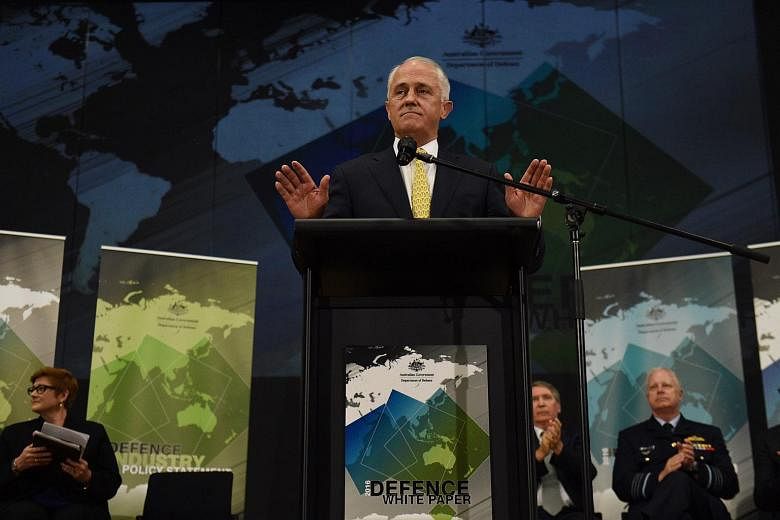Tucked away on page 46 of Australia's new 189-page Defence White Paper is a delicately worded clue to Canberra's position on one of the region's most pressing security questions.
In recent months, Australia has been facing growing calls to follow the lead of the United States and conduct freedom of navigation (FON) naval patrols near disputed territory in the South China Sea.
While it has deployed air patrols, Australia has yet to openly conduct a naval patrol within 12 nautical miles of contested territory. The issue has sparked vigorous debate among analysts and politicians, with growing calls for patrols to send a message to China about its construction of artificial islands.
In his public comments, Prime Minister Malcolm Turnbull has remained coy on the issue, refusing to firmly state Australia's intentions.
Releasing the 20-year document on Thursday, he said: "We support and practise freedom of navigation in accordance with international law, but we are not going to canvass, forecast future (Australian Defence Force) operations."
But a small section on page 46 of the document, in a lengthy chapter on Australia's "strategic outlook", suggested its military is very much canvassing plans for a naval patrol.
"The government is committed to working with the United States and like-minded partners to maintain the rules-based order by making practical and meaningful military contributions where it is in our interest to do so," it said.
Significantly, the equivalent section of the last White Paper in 2013 included no such statement.
Most analysts in Australia believe Mr Turnbull is deliberately keeping his cards close to his chest, but is likely to approve a maritime patrol.
"There is a strong possibility we'll become more involved in the South China Sea, particularly through freedom and navigation exercises alongside the Americans or other regional partners," Dr Malcolm Davis, from the Australian Strategic Policy Institute, told The Australian Financial Review.
Visiting Australia last week, Vice-Admiral Joseph Aucoin, Commander of the US Seventh Fleet, publicly stated he believed Australia should conduct naval patrols rather than leave them entirely to Washington.
He said he was concerned that efforts to challenge China's island- building and territorial claims in the South China Sea would be portrayed as "the US versus China".
"All countries, no matter what the size or strength, can pursue their interests based on the law of the sea," he told Fairfax Media. "It's up to those countries but I think it's in our best interests to make sure those sea lines remain open."
Still, some analysts have urged caution, saying Australia should conduct naval patrols but stay away from disputed reefs and shoals.
"It's certainly clear now that some in the Pentagon are looking for - indeed pushing hard for - Australia, and other US allies in the region, to conduct more robust patrols in the South China Sea," said Professor James Curran, from Sydney University.
"But to date, Australia has the correct policy settings on this matter. We should be cautious about signing up to Washington's agenda on the South China Sea, but not hesitate either to push back against Chinese over-reach."
Beijing was not thrilled with the White Paper, saying it was "dissatisfied" with the warnings about China's contribution to rising regional tensions.
The Chinese comments only highlighted Australia's dilemma as it finds itself caught amid potential rivalry between the US, its main security ally, and China, its biggest trading partner.
If Australia ultimately opts to openly conduct an FON exercise near disputed territory claimed by China, it will inevitably provoke an irate response from Beijing, not least because Canberra will appear to be siding with Washington.
The difficulty for Canberra and the broader region, as the White Paper made clear, is that there is a growing possibility that such debates will only continue in the coming years - and that they are set to become both more frequent and more consequential.

